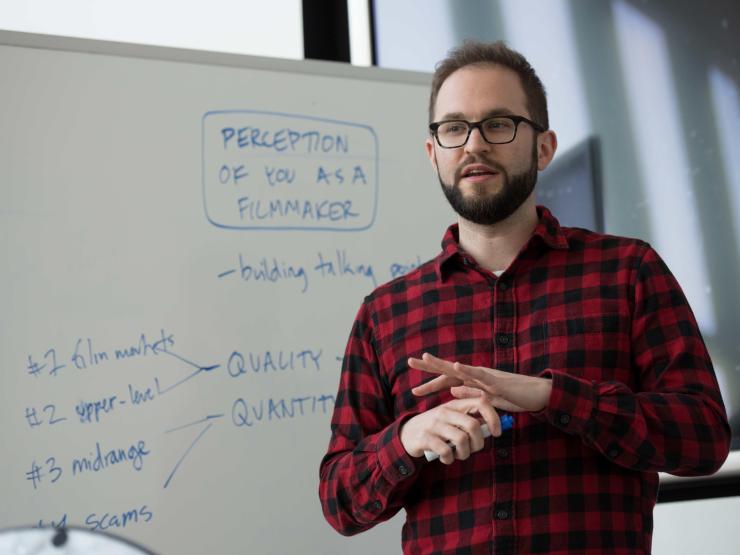Emerson College’s low-residency Writing for Film and Television graduate program requires the completion of 40 credits. Housed in the School of Film, Television, and Media Arts, the program begins with a weeklong residency each semester, which will be held on either our Boston (Fall) or Los Angeles (Spring) campus.
Following the residency, you will take two online classes each semester. Online classes are primarily asynchronous, with some synchronous elements included. As an MFA candidate, you will complete a professional-caliber portfolio that contains the following:
- Short Screenplays
- Feature Screenplay
- Television Spec Script
- Original Television/Cable/Streaming Pilot
- Additional Script (Pilot or Feature Screenplay)
- Critical Essays
Courses
| Number | Course | Modality | Credits |
|---|---|---|---|
| SW 631 | Writing Workshop I - Writing for Short-Form Media | Online | 4 |
| SW 621 | Film Genres | Online | 4 |
| N/A | Residency I: Storytelling and Writing Short Scripts (Boston) | In-person | 2 |
| Number | Course | Modality | Credits |
|---|---|---|---|
| SW 632 | Writing Workshop II: Writing Series Television | Online | 4 |
| SW 622 | The Writer’s Room | Online | 4 |
| N/A | Residency II: Series Television Writing (LA) | In-person | 2 |
| Number | Course | Modality | Credits |
|---|---|---|---|
| SW 633 | Writing Workshop III: Feature Film Screenwriting | Online | 4 |
| SW 624 | Writers in Development | Online | 4 |
| N/A | Residency III: Long-Form Writing (Boston) | In-person | 2 |
| Number | Course | Modality | Credits |
|---|---|---|---|
| SW 698 | MFA Thesis Project | Online | 4 |
| SW 623 | Television Genres | Online | 4 |
| N/A | Residency IV: The Business of Screenwriting (LA) | In-person | 2 |
*Note: These are subject to change
Residency Schedule
See our Academic Calendar for specific residency dates for each semester.
Online Academic & Management Guidelines
Our low-residency Writing for Film and Television MFA requires students to be self-directed and disciplined in time management in order to meet the weekly demands of the lectures, readings, film viewings, and discussions, as well as time devoted to writing.
Students should expect to spend a minimum of 8–10 hours per week on writing and coursework and should approach our online environment with just as much attention as any on-campus graduate program.
Students in each cohort have their own way of connecting outside of the structured online courses via texting, emails, in-person meetups, or virtual group calls. Faculty members are available for virtual and in-person office hours to support students’ writing and growth.
